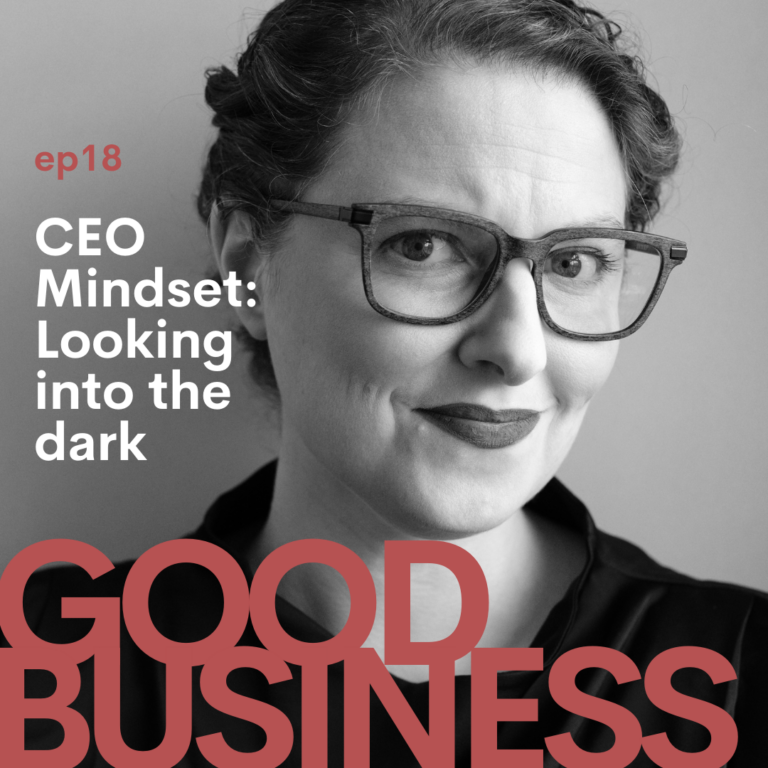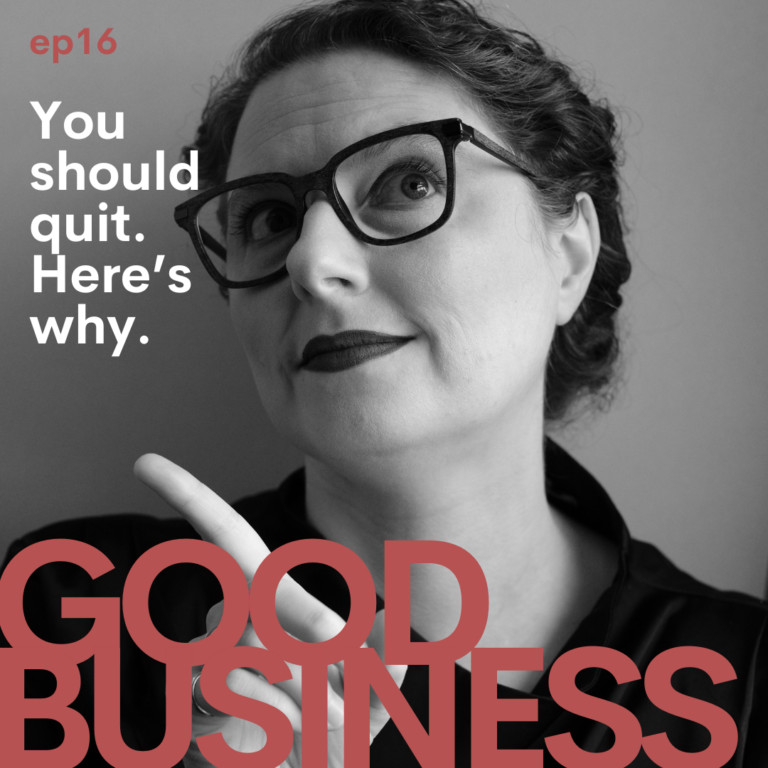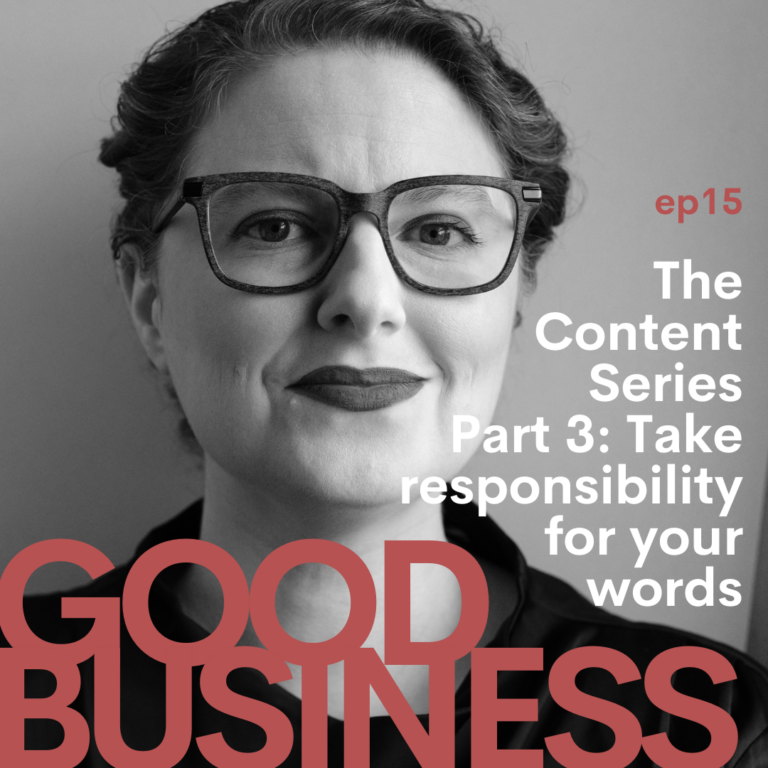Episode Transcript:
I’m Illana Burk, CEO of Your Life’s Workshop, coach to entrepreneurs and solopreneurs across dozens of industries and host of Good Business. With nearly 20 years experience helping hundreds of clients create profitable, ethically driven and sustainable businesses based on their life’s work, I’m here to teach you how to do great work, make great money, and make a positive impact without feeling like you need a shower afterward.
Hi everybody. Today’s episode is all about the sort of counterintuitive idea of why overdelivery is a good way not to get asked back for more work. So, first off, I know this sounds really, really counterintuitive. I know this sounds backward. We all think that doing our best and giving more than people ask for is a good thing. In some ways, it is. Things like adding extra value to something you do is fine. What I’m talking about more is when you completely blow the scope out of what you were doing out of the water, right? It’s one of the hardest things to identify when you’re trying to figure out why no one seems to hire you twice. I mean, it’s so easy to be like, “I went so far above and beyond. Why wouldn’t they want me back?” Which makes sense on the surface. Why wouldn’t someone love paying for one thing and getting way more?
Well, because of a whole bunch of reasons. I’m going to run down a few of those for you right now, mostly related to a total lack of perspective on your part. Sorry, but true. We’re going to go through reasons, and when you do the thing, what that thing says to the client.
Okay, so first off, politics. Let’s say you’re a designer and you get hired to work on some creative for an ad campaign, you do the job and then you also send a dossier of how they can better design their social media graphics. What you didn’t know is that the CEO has a passion for social media and is doing all of those herself. She now thinks your work is useless because you don’t like something that she did that she has a personal connection to. It has nothing to do with your work, but your misstep tainted the actual core work that you did get hired for. Now they don’t want it at all because now they have the general bad feeling about you — an easy way to not get hired.
The second is boundaries. Let’s say you’re a writer who gets hired to work on copy for a company’s homepage revamp. You deliver that, and you throw in some copy for their homepage and their services pages too, with an offhanded, “You know, once I get started, I just can’t stop,” type of remark. By doing that, you just told them two things. One, your time is not valuable at all. If you can do all of that in the same amount of time and under the same budget that one thing they hired you for cost, why would they ever believe you when you say that your time is valuable? It clearly isn’t. Second, you thought their other copy was crap. What if they just spent a small fortune on getting all of that redone, and it was done with goals in mind that you’re not privy to because that’s not what you were hired to do?
Third is the budget. Let’s say you’re a social media strategist hired to manage just Facebook through a big new product launch that’ll last 30 days, and you deliver content for the next six months. You have now made the client feel like they should pay you for all that work if they’re nice humans. They can only afford the work they hired for, and if they’re good humans, this will make them feel bad. A sure-fire way to never get called again, even though they loved you and you love them. Even though you’re both super great people and your overdelivery was because you wanted to help, you’re putting them in a position to feel guilty and shitty because they can’t afford to pay you more. They can’t afford to pay you what you’re worth, and they could afford to pay you for what they hired you for. It’s putting things out of balance, and good work requires an energetic balance for success on both sides.
Overdelivery is manipulative. I know you don’t mean to be, but it’s true. It can make the hiring party feel like they’re doing something wrong either in their business or in hiring you, and since you are the thing that they can change to rebalance that power structure, guess what? They’re going to rebalance the power structure and not hire you back and probably disregard the work they did pay you for, which is shitty. You have prevented them from getting what they paid for. It doesn’t matter how good the work is. It doesn’t matter how right you were. The only thing that matters about generosity is that generosity only works when it honors the boundaries set by those who are being offered it. If they wanted you to do more than they hired you for, they would’ve said so. Failure to honor those boundaries says that you don’t respect them. You don’t respect their boundaries. You don’t respect the parameters of what they’re asking you for. There’s probably more to it that you don’t realize. It says that you don’t respect your own time. It says that you should have charged them less. It says that you’re desperate and have too much time on your hands, and it says that you don’t care what they want. You’re trying to give them what they need without being asked for that.
Instead, if you feel compelled to do more, do it within the scope of what you were hired for. Give an extra option than originally agreed upon. That’s fine. Offer a free consult to talk about more ideas for other areas that might need some work. Send an appropriate gift to the person who hired you. Offer to do a proposal for future work, but don’t do it until they give you the green light. Send them articles that will support them in deepening their thinking about the work you did for them. Do a good job at the thing they hired you for, and they will ask you back to do more.
That is how it works. Overdelivering will not do it. Giving more than you were asked to do will not do it. I promise you that. Next time, when you’re trying to think about how to close a job, close it by finishing it. That’s it. Do the job, do it well, deliver on time, and then offer anything that you can do. Any other services should be on the heels of that, but let them soak that in. If you’re going to overdeliver, make what you were hired to do a little bit better, not like a crazy amount better. Not like 10 steps beyond what they asked you to do, but a little more than what they expected. That’s how you overdeliver and make it pay off.
All right, everybody, thank you so much for joining me today. I hope you all have a really great week. Bye.
Thanks so much for hanging out with me today. For more information, visit www.thegood business.co or www.lifesworksdev.wpengine.com.
More Episodes
Why trust-building beats list-building every day of the week | GB19
Today’s episode is all about why focusing on listbuilding as your primary focus in client acquisition is the very best way to feel like you’re banging your head against a wall. It’s also the very best way to make the people you MOST want to connect with feel like the only think that matters to you about THEM is their email address.
CEO Mindset: Looking into the dark | GB18
Today’s episode is on one area of what people call the ‘CEO Mindset’. First, we’ll dig in a little to what people THINK this means. Then, we’ll talk through what it ACTUALLY means. And finally, we’ll wrap up with some simple truths about how to do this better and why doing so is necessary to actually grow.
What to do when you just can’t get fired up about a great idea | GB17
Today’s episode is all about what to do when you’re working on something that you love but you can’t figure out why it just. isn’t. working. First, we’ll talk about what it feels like to love something but not be lit UP by it. Then we’ll talk about what to do about it and how to fix it. And finally, we’ll wrap up with some inspiring examples of how this works in action.
Are you a quitter? Because the world needs more quitters. | GB16
Quitting usually comes with shame. It feels like bad decisions and ignorance and can certainly be predicated on failure, but it is, and will always be a choice that is 100% within your control. You can’t be forced to quit. You...
The Content Series: Take responsibility for your words | GB15
Gone are the days of taking out an ad in the local newspaper to get foot traffic. When you start a business this day in age, you have to not only have something to SELL, you have to have something to SAY.
The Content Series: Why telling the truth is the only content strategy left | GB14
Today’s episode is all about the last frontier of content marketing: The bold notion that you can tell the whole truth and people will buy whatever you’re selling.






